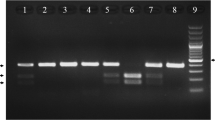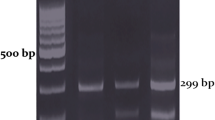Abstract
Several association studies of type 2 diabetes mellitus (T2DM) and adiponectin gene polymorphisms have been reported with conflicting results. Our aim was to search for the association of three polymorphisms (−11.391G>A, +45T>G, and +276G>T) in the adiponectin gene with T2DM and prediabetic quantitative traits in Polish Caucasians. The study groups comprised 495 unrelated T2DM cases and 435 controls. We compared the distribution of genotypes between study groups. In addition, genotype-quantitative trait analyses were also done in the controls. The study subjects were genotyped using the restriction fragment length polymorphism technique. The frequencies of the minor alleles were as follows: 10.6 versus 8.2% for −11.391G>A (p = 0.0722), 7.0 versus 8.0% for +45T>G (p = 0.48), and 15.5% in T2DM versus 19.8% in controls (p = 0.0145) for +276G>T, respectively. The difference for genotype distribution between the groups was statistically significant (p = 0.0247) for the +276G>T variant: 71.31 versus 62.99%, 26.46 versus 34.48% and 2.22 versus 2.53%, respectively, for GG, GT and TT. In quantitative traits analysis, the T allele of +276G>T was associated (p < 0.05) with lower insulin resistance (HOMA-IR, fasting insulin) among controls. Additionally, the A allele at position −11.391 was associated (p < 0.05) with higher insulin resistance (HOMA-IR, fasting insulin). In multiple regression analysis, all identified association remained significant after the inclusion in the model of gender, BMI and age. In addition, in this model, −11.391G>A and +276G>T were independently associated with T2DM. Finally, we conclude that the adiponectin gene polymorphisms are associated with T2DM and prediabetic quantitative traits in Polish Caucasians.
Similar content being viewed by others
References
Kronenberg F (2008) Genome-wide association studies in aging-related processes such as diabetes mellitus, atherosclerosis and cancer. Exp Gerontol 43:39–43
Rampersaud E, Damcott CM, Fu M et al (2007) Identification of novel candidate genes for type 2 diabetes from a genome-wide association scan in the old order Amish: evidence for replication from diabetes-related quantitative traits and from independent populations. Diabetes 56:3053–3062
Hayes MG, Pluzhnikov A, Miyake K et al (2007) Identification of type 2 diabetes genes in Mexican Americans through genome-wide association studies. Diabetes 56:3033–3044
Luke A, Wu X, Zhu X et al (2003) Linkage for BMI at 3q27 region confirmed in an African–American population. Diabetes 52:1284–1287
Berg AH, Combs TP, Du X et al (2001) The adipocyte-secreted protein Acrp30 enhances hepatic insulin action. Nat Med 7:947–953
Yamauchi T, Kamon J, Minokoshi Y et al (2002) Adiponectin stimulates glucose utilization and fatty-acid oxidation by activating AMP-activated protein kinase. Nat Med 8:1288–1295
Ouchi N, Kihara S, Arita Y et al (2001) Adipocyte-derived plasma protein, adiponectin, suppresses lipid accumulation and class A scavenger receptor expression in human monocyte-derived macrophages. Circulation 103:1057–1063
Scherer PE, Williams S, Fogliano M et al (1995) A novel serum protein similar to C1q, produced exclusively in adipocytes. J Biol Chem 270:26746–26749
Arita Y, Kihara S, Ouchi N et al (1999) Paradoxical decrease of an adipose-specific protein, adiponectin in obesity. Biochem Biophys Res Commun 257:79–83
Yamauchi T, Kamon J, Waki H et al (2001) The mechanisms by which both heterozygous peroxisome proliferator-activated receptor gamma (PPARgamma) deficiency and PPARgamma agonist improve insulin resistance. J Biol Chem 276:41245–41254
Heid IM, Wagner SA, Gohlke H et al (2006) Genetic architecture of the APM1 gene and its influence on adiponectin plasma levels and parameters of the metabolic syndrome in 1,727 healthy Caucasians. Diabetes 55:375–384
Tso AW, Sham PC, Wat NM et al (2006) Polymorphisms of the gene encoding adiponectin and glycaemic outcome of Chinese subjects with impaired glucose tolerance: a 5-year follow-up study. Diabetologia 49:1806–1815
Sutton BS, Weinert S, Langefeld CD et al (2005) Genetic analysis of adiponectin and obesity in Hispanic families: the IRAS family study. Hum Genet 117:107–118
Takahashi M, Arita Y, Yamagata K et al (2000) Genomic structure and mutations in adipose-specific gene, adiponectin. Int J Obes Relat Metab Disord 24:861–868
Menzaghi C, Trischitta V, Doria A (2007) Genetic influences of adiponectin on insulin resistance, type 2 diabetes and cardiovascular disease. Diabetes 56:1198–1209
Malecki MT, Frey J, Moczulski D et al (2003) Vitamin D receptor gene polymorphisms and association with type 2 diabetes mellitus in a Polish population. Exp Clin Endocrinol Diabetes 111:505–509
Schwarz PE, Govindarajalu S, Towers W et al (2006) Haplotypes in the promoter region of the ADIPOQ gene are associated with increased diabetes risk in a German Caucasian population. Horm Metab Res 38:447–451
Vasseur F, Helbecque N, Lobbens S et al (2005) Hypoadiponectinaemia and high risk of type 2 diabetes are associated with adiponectin-encoding (ACDC) gene promoter variants in morbid obesity: evidence for a role of ACDC in diabesity. Diabetologia 48:892–899
Vasseur F, Helbecque N, Dina C et al (2002) Single-nucleotide polymorphism haplotypes in the both proximal promoter and exon 3 of the APM1 gene modulate adipocyte-secreted adiponectin hormone levels and contribute to the genetic risk for type 2 diabetes in French Caucasians. Hum Mol Genet 11:2607–2614
Gu HF, Abulaiti A, Ostenson CG et al (2004) Single nucleotide polymorphisms in the proximal promoter region of the adiponectin (APM1) gene are associated with type 2 diabetes in Swedish caucasians. Diabetes 53(Suppl 1):S31–S35
Populaire C, Mori Y, Dina C et al (2003) Does the –11377 promoter variant of APM1 gene contribute to the genetic risk for type 2 diabetes mellitus in Japanese families? Diabetologia 46:443–445
Gibson F, Froguel P (2004) Genetics of the APM1 locus and its contribution to type 2 diabetes susceptibility in French Caucasians. Diabetes 53:2977–2983
Buzzetti R, Petrone A, Zavarella S et al (2007) The glucose clamp reveals an association between adiponectin gene polymorphisms and insulin sensitivity in obese subjects. Int J Obes (Lond) 31:424–428
Kita A, Yamasaki H, Kuwahara H et al (2005) Identification of the promoter region required for human adiponectin gene transcription: association with CCAAT/enhancer binding protein-beta and tumor necrosis factor-alpha. Biochem Biophys Res Commun 331:484–490
Bouatia-Naji N, Meyre D, Lobbens S et al (2006) ACDC/adiponectin polymorphisms are associated with severe childhood and adult obesity. Diabetes 55:545–550
Acknowledgments
This study was supported by the Polish Ministry of Education and Science 2 PO5A06728.
Author information
Authors and Affiliations
Corresponding author
Additional information
An erratum to this article can be found at http://dx.doi.org/10.1007/s00592-009-0163-y
Rights and permissions
About this article
Cite this article
Szopa, M., Malczewska-Malec, M., Wilk, B. et al. Variants of the adiponectin gene and type 2 diabetes in a Polish population. Acta Diabetol 46, 317–322 (2009). https://doi.org/10.1007/s00592-008-0091-2
Received:
Accepted:
Published:
Issue Date:
DOI: https://doi.org/10.1007/s00592-008-0091-2




